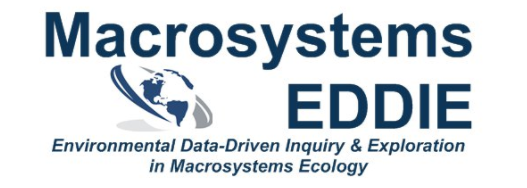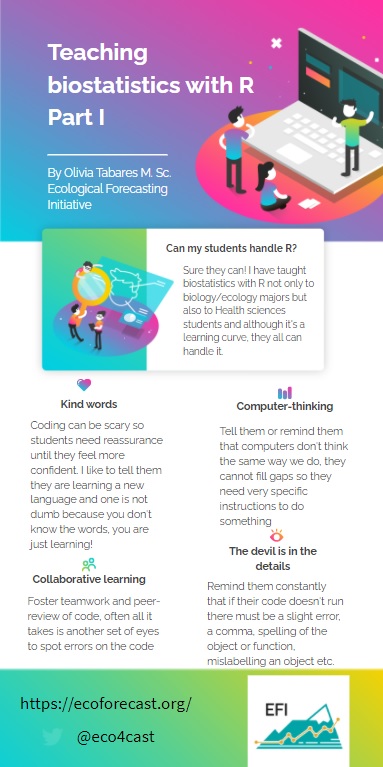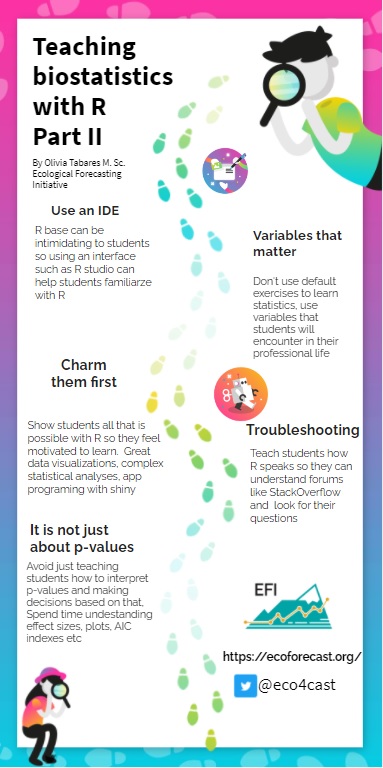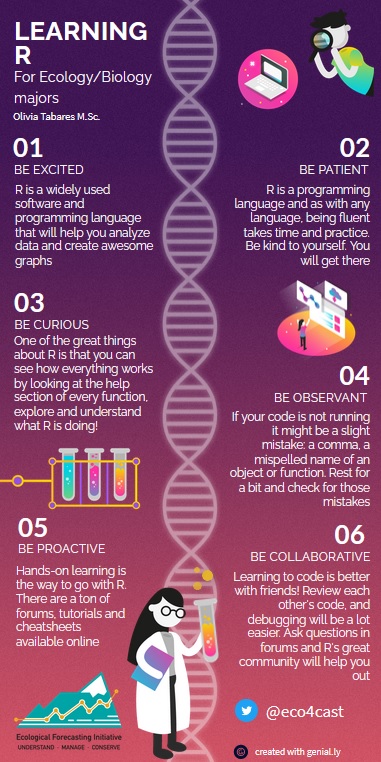This page provides:
- EFI Education Working Group Publications
- Ecological Forecasting Courses & Workshop Materials
- Macrosystems EDDIE Forecasting Resources
- A list of Inclusive Pedagogy Resources
- A compiled list of over one hundred educational resources related to Ecological Forecasting
- A compiled list of of articles, papers, and websites related to using AI in the classroom
- 2-page pdf overview of what ecological forecasting is and potential careers as well as examples of courses that is a starting point for students to learn more about the concepts and statistical and computational tools used in ecological forecasting
- Infographics to support teaching and learning biostats in R
- Example syllabi for ecological forecasting courses
Publications
Paper on Ethics in Forecasting Educational Modules was published in both Teaching Issues and Experiments in Ecology and as a QUBES Open Educational Resource. This allows us to reach a broader audience. A DOI is available with the QUBES publication. Here are the two citations:
- Lewis, A.S.L., D.W. Howard, G. Koren, C. Kowalski, J. McLachlan, J.A. Peters, G. Smies, and O. Tabares. 2023. Ethics in ecological forecasting: four case-based teaching modules. Teaching Issues and Experiments in Ecology, Vol. 19: Practice #13. https://tiee.esa.org/vol/v19/issues/case_studies/lewis/abstract.html
- Lewis, A. S., Howard, D. W., Koren, G., Kowalski, C., McLachlan, J., Peters, J., Smies, G., Tabares, O. (2024). Ethics in ecological forecasting: four case-based teaching modules. EFI-RCN: Ecological Forecasting Initiative Research Coordination Network, QUBES Educational Resources. doi:10.25334/5D99-Y019
Module topics from the ethics paper
- Module 1: Flying foxes and uncertainty
- Module 2: Marine Fisheries and conflicts of interest
- Module 3: Water Quality and Indigenous Knowledge
- Module 4: Tropical forests and data availability
Willson, A. M., H. Gallo, J.A. Peters, A. Abeyta, N. Bueno Watts, C.C. Carey, T.N. Moore, G. Smies, R.Q. Thomas, W.M. Woelmer & J.S. McLachlan. 2023. Assessing opportunities and inequities in undergraduate ecological forecasting education. Ecology and Evolution, 13, e10001. https://doi.org/10.1002/ece3.10001
Ecological Forecasting Courses & Workshop Materials
- Ecological Forecasting & Dynamics Course. A course on how ecological systems change over time and how to forecast how they will change in the future. Reading + discussion + R tutorials. This material can be used to independently learn about ecological forecasting or can be used and modified by instructors for course material. See Ernest et al. 2023, doi: 10.21105/jose.00198 for more details.
- Forecasting for Decision-Making: An Epidemiological & Ecological Perspective. A short course hosted by the Canadian EFI Chapter to build skills for producing more reliable and decision-relevant forecasts. Specific course topics covered included Bayesian model-fitting, forecasting with static vs. dynamic models, increasing model reproducibility, propagating uncertainties, incorporating decision-making priorities into forecasts, engaging with a lens of data sovereignty, and increasing effective communication.
- In the spirit of having the course be as open as possible, the course materials are available including lectures, exercises, and forecast modelling materials for three case studies: Infectious Disease Control, Fisheries Management, Water Quality Monitoring. The playlist of the lectures is available on the EFI YouTube channel here and the exercises and case study materials are on GitHub here.
- NEON Forecast Challenge Workshop. Workshop materials used in several national conferences to demonstrate how to participate in the NEON Ecological Forecasting Challenge with examples for the aquatics and terrestrial carbon Challenge themes. Learn how to submit forecasts, automate forecast workflows, and analyze forecast scores to understand how forecasts are performing. The material is dynamic and may change with future workshop presentations. The most recent archived version with a DOI is at: https://zenodo.org/records/8316966
- NEFI Short Courses. NSF-funded short courses adapted from the Ecological Forecasting book on topics of Bayesian statistics; fusing multiple data sources; forecast uncertainty propagation & assessment; iterative data assimilation; machine learning; decision science; and a range of ecological forecasting applications such as phenology, microbiomes, carbon, infectious disease, and aquatic productivity. These were in-person courses, but the hands-on activities from the courses are available here.
Macrosystems EDDIE Resources
Macrosystems EDDIE modules help students learn the foundations of macrosystems ecology through modeling and forecasting. Students simultaneously learn the core concepts of macrosystems science and develop the quantitative skill sets needed to conduct the next generation of environmental research.
Teach Ecological Forecasting in Your Class!

Are you looking for fresh curriculum ideas? Consider including a one to three-hour active learning module on ecological forecasting that allows students to explore key forecasting concepts using real environmental data. The materials in the modules are in an RShiny format that introduces the concepts and gives hands-on applications for what is taught. Students can save their progress in the RShiny app so they do not need to complete the materials in one sitting. Modules 6 and 7 are also available in an RMarkdown format for students with coding experience. This allows instructors who want to go a step further with their instruction to allow the students to understand and apply the code to new situations.
1) Module 5: Introduction to Ecological Forecasting (link to the module; link to the instructor materials)
2) Module 6: Understanding Uncertainty in Ecological Forecasts (link to the module; link to the instructor materials; link to the Rmarkdown material)
3) Module 7: Using Data to Improve Ecological Forecasts (link to the module; link to the instructor materials; link to the Rmarkdown material)
4) Module 8: Using Ecological Forecasts to Guide Decision Making (link to the module; link to the instructor materials)
These modules are part of the Macrosystems EDDIE series funded by the NSF Macrosystems Biology program. Each module uses NEON data to teach key forecasting concepts.
If you are interested in teaching these modules in your class, email Mary Lofton (melofton@vt.edu) or Cayelan Carey (cayelan@vt.edu).
QUBES Resources
A number of the Educational Resources are available as open educational resources on the QUBES platform. You can access the resources on QUBES individually below or find all of them compiled on QUBES here.
Inclusive Pedagogy Resources
HERE is the list of Toolkits, Papers, Discussion Techniques, Course Design, and Strategies and Principles. This list of resources was compiled for the EFI RCN Inclusive Pedagogy Workshop held on June 7, 2021. Recordings from the presentations from the Workshop are available HERE.
Educational Resources
HERE is a list of over one hundred educational resources related to Ecological Forecasting. You can also access this resource on QUBES.
- Resources include course material, videos, code repositories, modules, and online textbooks.
- Resources are organized around concepts of forecasting, basics of R, Python, ecology, and statistics, data sources, data skills, model building, the forecast cycle, applying forecasts, and using decision science or interpreting forecasts as end-users.
- Resources are categorized as Introductory, Intermediate, and Advanced
- Alyssa Willson, Peters, J. (2021). Ecological Forecasting Repository of Online Educational Resources. EFI-RCN: Ecological Forecasting Initiative Research Coordination Network, QUBES Educational Resources. doi:10.25334/XAW7-JW16
AI in the Classroom
The EFI Education working group had a discussion about using chatGPT and AI in the classroom in April 2024. HERE are the articles, papers, and websites that were compiled for or after that call.
Ecological Forecasting Overview and Examples of Useful Courses
This 2-page pdf provides an overview of what ecological forecasting entails, the types of careers ecological forecasters have, and examples of courses undergraduate and graduate students can take to learn concepts and statistical and computational tools in preparation to learn ecological forecasting. This resource was developed for undergraduate and graduate students and to be used by academic advisors to share with their students. This living document created by the EFI Education Working Group in 2021 will be updated as needed. Email suggestions for the document to eco4cast.initiative@gmail.com. An archived version of this pdf is available as a QUBES Resource cited as:
- Sjodin, A., Haber, L., LaDeau, S., Willson, A., Lofton, M., Moore, T., Tabares-Mendoza, O., Dalbotten, D., McLachlan, J., Dietze, M., Peters, J. (2021). Ecological Forecasting Student Resource: Overview of Forecasting, Potential Careers, Helpful Courses. EFI-RCN: Ecological Forecasting Initiative Research Coordination Network, QUBES Educational Resources. doi:10.25334/8VRF-WS31
Are you learning R, do you teach Biostats with R, or are you thinking of teaching Biostats with R? Here are suggestions and infographics you can use for support. This project was led by EFI Member Olivia Tabares and the Education Working Group and is also available on QUBES.
- Olivia Tabares-Mendoza (2021). Are you learning R? Suggestions to help you as you learn.. EFI-RCN: Ecological Forecasting Initiative Research Coordination Network, QUBES Educational Resources. doi:10.25334/C477-BA02
- Olivia Tabares-Mendoza (2021). Are you teaching biostatistics with R? Suggestions to help you as work with your students.. EFI-RCN: Ecological Forecasting Initiative Research Coordination Network, QUBES Educational Resources. doi:10.25334/737B-R258


Examples of Ecological Forecasting Courses and Syllabi
| Courses and Syllabuses | Instructors | Affiliation |
|---|---|---|
| Ecological Dynamics & Forecasting | Peter Adler | Utah State University |
| ESPM-288: Reproducible & Collaborative Data Science The class primarily worked through Rob Hyndman's Forecasting Principles and Practices online book. | Carl Boettiger | University of California, Berkeley |
| Topics In Ecological Forecasting | Cayelan Carey, Quinn Thomas | Virginia Tech |
| Ecological Forecasting and Informatics 2019 Ecological Forecasting and Informatics 2021 | Michael Dietze | Boston University |
| Ecological Dynamics and Forecasting | Morgan Ernest, Ethan White | University of Florida |
| Topics in Statistical and Data Sciences - Ecological Forecasting | Albert Kim | Smith College |
| Quantitative Ecology and Evolution Ecological Forecasting Seminar Machine Learning for Ecology Data Science for Biological Research (Pre-req for the Machine Learning for Ecology course) | Brett Melbourne | University of Colorado |
| Ecological Forecasting and Informatics 2014 Bayesian Statistics and Biological Forecasting 2022 | Jason McLachlan | University of Notre Dame |
| Near-Term Ecological Forecasting Initiative Short Course | NEFI team + rotating guest lecturers | BU, Cary |
| An Overview of Structured Decision Making - ALC3183 - Resources | Michael Runge, Sarah Converse | US Fish & Wildlife and USGS |
| Ecological Modeling and Forecasting | Quinn Thomas | Virginia Tech |
| Data Science for the Environment | Kai Zhu | University of California, Santa Cruz |
| Dinámica Ecológica y Predicciones (Ecological Dynamics and Predictions) | Peter Adler, Juan Manuel Morales | Utah State University, INIBIOMA, Universidad Nacional de Comahue |

